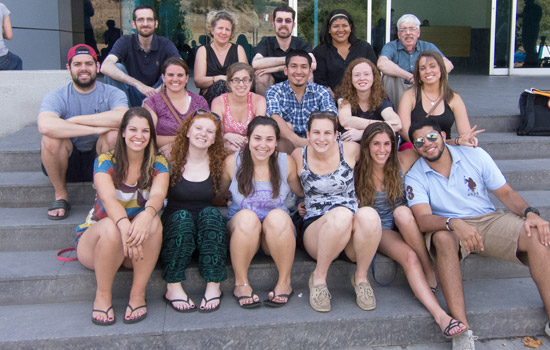NTID students go from chilly to Chile
NTID students traveled to South America to share cultures and experiences
A dozen students from NTID spent much of January’s intercession in Chile, learning about its history, culture, politics and Chilean Sign Language.
A dozen students from Rochester Institute of Technology’s National Technical Institute for the Deaf spent much of January’s intercession in Chile, learning about its history, culture, politics and Chilean Sign Language.
“By the end of the trip, we were all conversing with one another in Chilean sign, American Sign Language and Spanish,” said Denise Kavin, an NTID faculty member and liaison between NTID and RIT’s study abroad program. “Yes, it was confusing, but oh, so cool.”
Students plan to talk about their trip, deaf associations in Chile, rights for deaf citizens there, and interpreters at 7 p.m. tonight (April 7) and again at noon on Wednesday, April 9, in the Student Development Center, room 1300. The talk is free and information will be available for students interested in participating in future study-abroad programs.
The students prepared for their trip with a 15-week course about Chile. Then, as Rochester embarked on a cold, snowy January, the group – including two interpreters and three faculty members – flew to Santiago.
“We had 85 degrees every day while Rochester had subzero temperatures,” said Michael Stein, a faculty member in NTID’s liberal arts program. Stein, who previously lived in Chile for a year, helped plan the trip.
“We focused on getting to know the Chilean deaf community, to learn more about deaf rights there and to expand cultural awareness,” Stein said. “For many of our students, it was the first time they traveled abroad.”
The group visited schools and beaches, sampled exotic foods and shared their experiences with students there who were deaf.
They learned many deaf children in Chile never go to high school because there are so few full-time interpreters for them, and no certification process for interpreters. Also, deaf individuals aren’t allowed to drive in many parts of the country.
The students watched some television, but it was not captioned. CNN provided news with an interpreter signing on the screen. And instead of using a videophone with an interpreter as they do in the United States, they needed to contact an interpreter on Skype and sign to the interpreter, who would hang up and follow up with email. “They appreciate it, even though it’s not a live conversation,” said Megan Bernella, an international studies major from Austin, Texas. Bernella noticed clubs for the deaf in Chile are a centralized place for the deaf community to gather and socialize, just as they had been before technological advancements in the U.S.
“They are behind in technology, but it keeps the deaf clubs alive there,” Bernella said.
“Chile and the Deaf Community” is expected to be offered to students in the fall, with a two-week trip planned in January 2015. A trip to Costa Rica is planned this June and eight RIT/NTID students took a photography course as part of the Deaf Studies program at the Siena School in Siena, Italy, last summer.
“RIT is committed and preaching the need for study-abroad programs, Kavin said. The students earned six credits for their study and travel.
“If you ever want to travel to another country, grab the opportunity,” said Hugo Perez, a civil engineering technology major from Los Angeles.
The deadline to register for next year’s trip to Chile is April 14. Those with questions about RIT/NTID study-abroad opportunities may contact Denise Kavin at dskpen@ntid.rit.edu or Michael Stein at mddnce@rit.edu.















